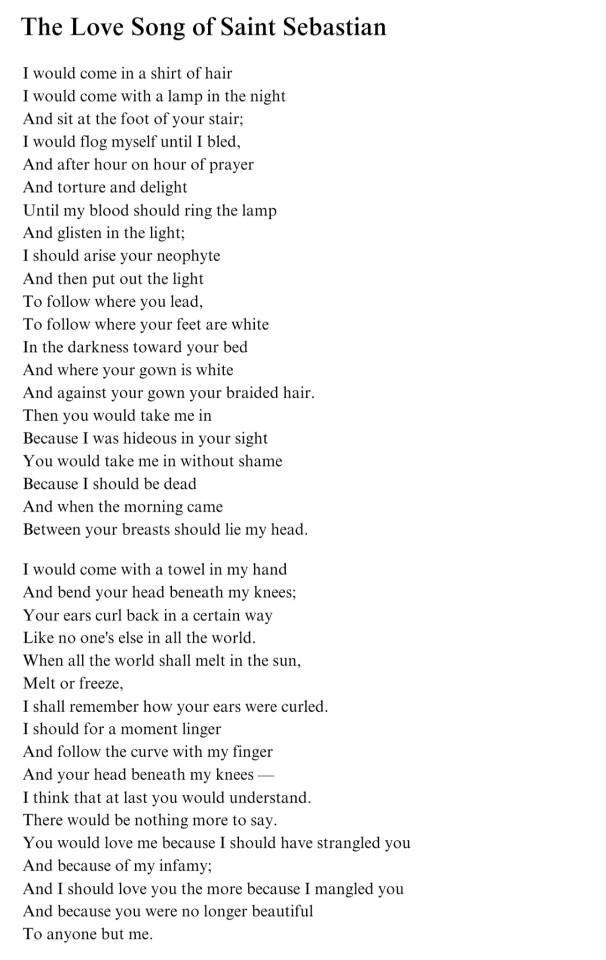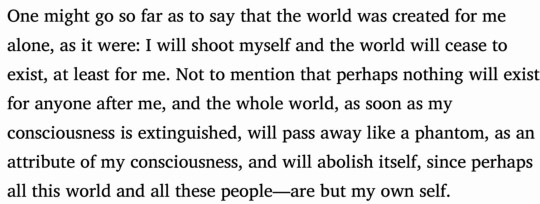Note
please do 10 classic recs
There are many ways I could answer this: I could either name 10 classics I think most people could easily enjoy — but let's be frank, there are already tons of lists on Pinterest for that —, or recommend you 10 classics I'm particularly fond of. But I'll go with the second, for one it's much easier, and also perhaps you'll discover some good literature you haven't yet read and find out we have common literary taste.
The Brothers Karamazov, Fyodor Dostoevsky.
The Carnivorous Lamb, Agustin Gomez-Arcos.
The Iliad, Homer.
Wuthering Heights, Emily Brontë.
Madame Bovary, Gustave Flaubert.
The Collected Poems of T.S Eliot.
The Divine Comedy, Dante Alighieri.
The Strange Case of Dr. Jekyll and Mr. Hyde, Robert Louis Stevenson.
The Oresteian Trilogy, Aeschylus.
Pale Fire, Vladimir Nabokov.
I sincerely hope you'll enjoy these, and if you happen to have already read them all, don't hesitate to tell me and I'll recommend you some more.
4 notes
·
View notes
Text

Cyril Connolly, from “The Unquiet Grave: A Word Cycle by Palinurus”, originally published c. 1944.
2 notes
·
View notes
Text

T. S Eliot, “The Love Song of Saint Sebastian”
#Poems I Know By Heart#T.S Eliot#The Love Song of Saint Sebastian#Poetry#American Literature#Lit#Full Poem#Quotes#Dark Academia
14 notes
·
View notes
Text

Fyodor Dostoevsky, from “The Dream of a Ridiculous Man,” tr. Alan Myers.
16 notes
·
View notes
Text

Fyodor Dostoevsky, from “The Dream of a Ridiculous Man,” tr. Alan Myers.
73 notes
·
View notes
Text

Fyodor Dostoevsky, from “The Dream of a Ridiculous Man,” tr. Alan Myers.
37 notes
·
View notes
Text




You don't understand, I want — no, I need one of these. My life will only be complete when I'll have a big, dramatic wooden desk.
359 notes
·
View notes
Text

Fyodor Dostoevsky, from “The Dream of a Ridiculous Man,” tr. Alan Myers.
20 notes
·
View notes
Text

Fyodor Dostoevsky, from “The Dream of a Ridiculous Man,” tr. Alan Myers.
111 notes
·
View notes
Text
when madeline miller wrote “he is half of my soul, as the poets say" and when emily brontë wrote “do not leave me in this abyss! oh god it is unutterable! i cannot live without my life! i cannot live without my soul!" and when i started feeling this unspeakable longing for what seems to be a romantic connection just last night but my soul is whole in itself and seeks nothing more than the gentleness found in the presence of another.
#That too!! Where did it go? Why did i delete it? omg#anyway bringing it back because the sentiment was real
617 notes
·
View notes
Text
whoever knows me knows that in order to understand who i am you have to keep in mind that passage that anais nin wrote “i have always been tormented by the image of multiplicity of selves. some day i call it richness and other day i see it as a disease" and that one from virginia woolf “i am not one and simple, but complex and many" and that one walt whitman gave us “do i contradict myself? very well then i contradict myself. (i am large, i contain multitude)” and make peace with that as much as I had to in order to love myself properly.
#That moment when you stumble over old posts you deleted — why I couldn't possibly tell — and remember past versions of you.#When did I write that? Why did I delete it?
2K notes
·
View notes
Text

Pierre Corneille, from “The Cid”, tr. A.S. Kline, 2007
225 notes
·
View notes
Text

Constantine P. Cavafy, from “Modern Greek Poetry; ‘The Bandaged Shoulder’”, tr. Kimon Friar.
409 notes
·
View notes
Text

T. S. Eliot, from “Collected Poems: 1909-1962; The Waste Land”, originally published c. 1963.
15 notes
·
View notes
Text

T. S. Eliot, from “Collected Poems: 1909-1962; The Waste Land”, originally published c. 1963.
6 notes
·
View notes
Text

Thomas Mann, from “Death in Venice”, originally published c. 1912.
3K notes
·
View notes
Note
May I ask how many languages you speak?
This is a question I’m often asked and it is a difficult one to answer. While I could give you a number, it would feel dishonest, as I have varying degrees of knowledge of languages, and do not have the same level of proficiency in every one of them.
To be true to you, I’m going to go in a declining order of proficiency, starting with my native language — which is French.
Afterwards come the languages in which I am fluent, typically the languages that I can speak the best and the most confidently; languages I can speak, write or read in almost as well as in my native language — which are English, Italian, Spanish.
Then, the languages I can communicate with by 50% I'd say, mostly because of a lack of vocabulary — which are German and Russian. German I had started studying for my girlfriend at the time, but eventually never completed. Russian was being learnt around the same period but eventually, this too, I let go of.
Then, come the languages I can perfectly read and write in, and could probably speak if given the occasion, but unfortunately said occasion never comes — which is Latin.
Finally, the languages I know the basics of, and can make small talks with — Arabic (Egyptian Dialect).
Currently I am studying Polish, and I intend to resume learning German and Russian right after. Ideally, once these will be done, I'll move to Classical Greek — understand Attic, but perhaps Koiné too, if i am not dead by then —, and Slovak. And again, afterwards, Hebrew and Arabic — the latter of which I already know the basics of but would like to study more seriously. I would love to learn Farsi in a few years as well.
Funnily enough, besides my native French, English is the language I've known the longest and yet it is also the only language I still make mistakes in — generally because of inattention, such as texting too fast and not taking the time to actually think about it or selecting whatever tense sounds better in my mind instead of sticking to actual rules.
11 notes
·
View notes